China Insight
Anti-Black Racism Dominates Online Discussions over ‘Privileged’ Exchange Students in China
Controversy erupted when Jinan University allegedly ‘forced’ female students to accompany exchange students from Congo.
Published
6 years agoon
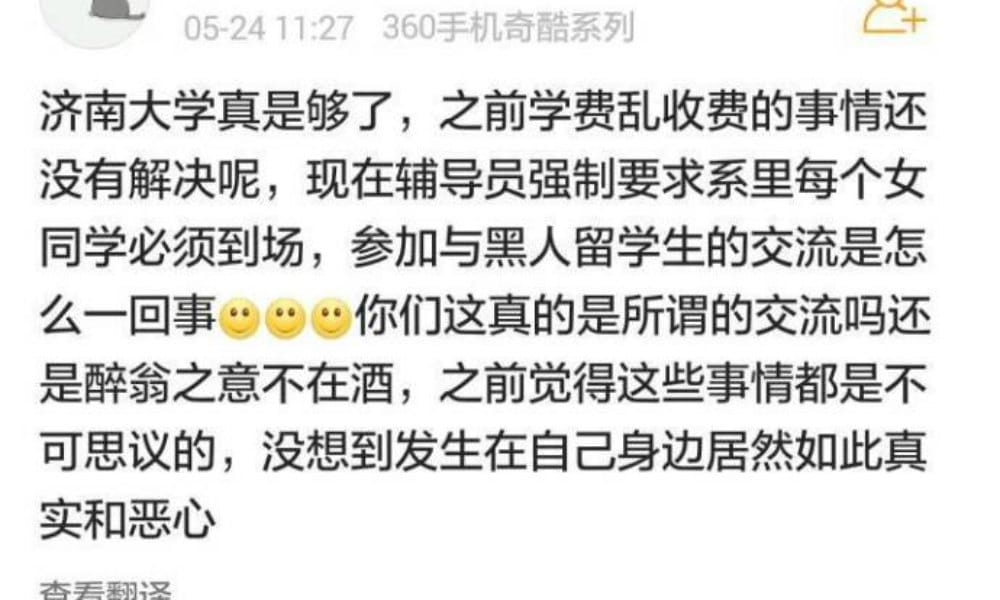
This week has seen various heated discussions on Chinese social media regarding the alleged privileged position of exchange students in the PRC. Anti-black racism is ubiquitous within these online discussions.
In the same week that a short video exposing the dorm disparity between Chinese and foreign students went viral, another issue has sparked controversy regarding overseas students in China.
This time, Chinese bloggers and social media users show their discontent with another type of alleged “internationalization” at Chinese universities – Jinan University in specific.
The controversy was triggered by a Weibo post published on June 24, in which a female netizen claimed that Jinan University was “forcing female students to participate in [cultural] ‘exchange’ activities with black exchange students.”
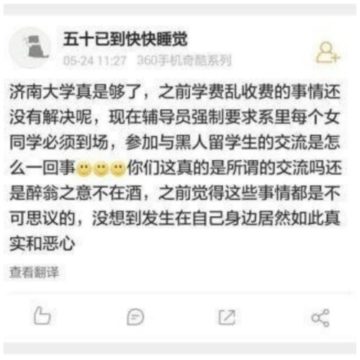
The post added fuel to recent ongoing discussions about the privileged position of foreign students, in which many Chinese social media users show their anger over exchange students’ relatively better dorm conditions, the scholarships they get, and other ways in which universities allegedly prioritize the comfort of international students over that of Chinese students.
This week, the alleged installment of new air-conditioning at the exchange students’ dorm at Jinan University – rather than an installment of air-conditioning at the Chinese students’ dorm – also sparked anger.
“Why don’t they send their own wives and daughters to ‘communicate’ with black students?”
What stands out in these online discussions is that, although there is a general anti-foreign trend, many netizens specifically talk about black students when they vent their anger, with waves of anti-black racism permeating these debates.
The claim that Chinese female students would be required to participate in on-campus activities with black exchange students triggered controversy on many online media platforms, from Sina Weibo to Zhihu.com and Tianya.
Some internet commentators suggested that it was improper for university staff to ‘assign’ Chinese girls to African students.
Photos of the programme arranged for the foreign students, in which Chinese students were to take part in, also leaked online.
“Not only does China educate these black devils for free, lets them eat and live for free on a scholarship, but also do they provide them with women. Just reincarnate me as a black person in my next life,” one commenter on messageboard Tianya writes.
“Why don’t they send their own wives and daughters to ‘communicate’ with black students?”, one Weibo user asked.
Jinan University responded to the online controversy on Weibo, writing:
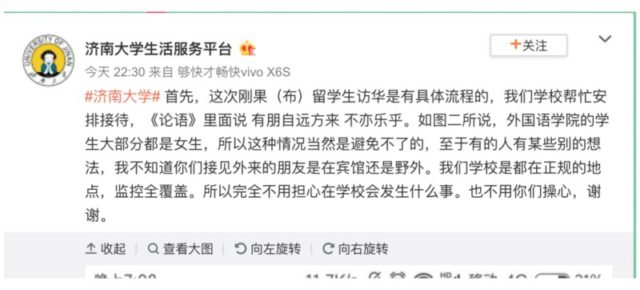
“Firstly, these exchange students from Congo visited China with a clear sequence of processes. Our school helped to arrange the welcoming of these visitors, as is said in The Analects of Confucius: ‘What a pleasure to have friends come from afar.’ (..) Since our students from the foreign language department are mostly female, these circumstances were unavoidable. (..). Our school is on a regular site and is all monitored. No one needs to worry that something would happen at our school.”
“Is this the People’s Republic of China, or People’s Republic of Africa?”
With the promotion of the One Belt One Road initiative and closer China-Africa relations, thousands of African students come to China on scholarships every year, pursuing undergraduate and graduate degrees subsidized by the government.
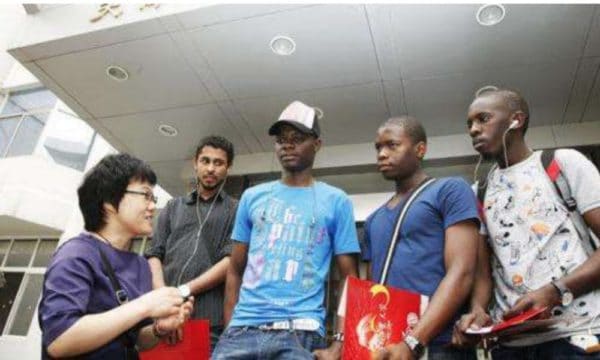
African exchange students at Hefei University (via Hushe.net).
According to Quartz Magazine, more Anglophone African students studied in China in 2017 than in the United States or the United Kingdom, which used to be their traditional destinations of choice.
The issues of the recent viral short movie – exposing the better living conditions of foreign students – together with the Jinan University controversies, have sparked off hundreds of comments on Weibo over the past week.

Exchange student featured in the short movie that went viral this week.
Saying they feel that Chinese students are being treated as “second-class citizens,” some netizens ask: “Is this the People’s Republic of China, or People’s Republic of Africa?”
“The Ministry of Education has become like an immigration office,” one Weibo user says: “It is damaging our country.”
Some blogs focusing on “black exchange students” in China say they bring HIV into the country, writing: “The Ministry of Education spends ten-thousands of yuan to let these low-class exchange students come to China, yet they haven’t had medical checks and bring in diseases.”
This is a recurring pattern on Weibo and other Chinese social media, where phrases such as “black devil go away” or “black monkey go back to Africa” are commonplace. Discrimination of Africans often comes with issues in which Chinese netizens themselves somehow feel marginalized or discriminated.
“The denigration and discrimination of black people is spreading like an epidemic.”
Online racism against Africans has been an ongoing issue on Weibo since the platform was launched in 2009. At the time, an essay about the racism against Chinese in Africa drew much attention. In 2013, Weibo was flooded by news of Chinese being killed in Ghana.
The existing idea that Chinese are looked down upon in Africa has allegedly worsened anti-African sentiments in China, although there are also those who already warned in 2013 that “the denigration and discrimination of black people [in Africa by the Chinese] is spreading like an epidemic.”
Throughout the years, multiple news stories concerning Africans have triggered waves of racist remarks. In “From Campus Racism to Cyber Racism,” scholar Cheng (2011) argues that anti-black racism in China has re-emerged with China’s deeper economic involvement in Africa, due to which large numbers of Chinese and Africans have come to work and study in each other’s countries.
Cheng writes that, although there already were waves of racism against Africans in the early post-Mao era, it has resurfaced over the last decade with the rise of China as a global power. Given that there are still many Chinese regarding Africans as “racially inferior,” “these people think it is wrong for Africans to create social problems in Chinese cities and impede China’s actions in Africa” (561).
“Chinese students often suffer discrimination when they go abroad. Why would they do the same to black students here?”
What is noteworthy is that anti-African sentiments on Weibo are mostly targeted at black men, not black women, and that their relations with Chinese women are strongly denounced. (Note: the Google image search results for ‘black African exchange student’ in Chinese (非洲黑人留学生) are very telling for what African exchange students are associated with online). It is perhaps for this reason that the Jinan incident especially ignited controversy.
But there are also those who resist racial stereotyping and discrimination.
Popular Weibo blogger Mai Tian (@麦田) wrote this week: “Lately, in the news feed of Weibo, I see more and more content that denounces Chinese girls being romantically involved with black men. This kind of content distributes racial discrimination, narrow-minded views, and a conceited stinkiness. It’s unbearable.”
“Chinese students often suffer discrimination when they go abroad. Why would they do the same to black students here?”, another commenter writes.
Others think the problem can be easily solved: “Just give Chinese students the same dorm conditions as other students and foreign students.”
For now, discussions are quieting down; most online threads and articles discussing this issue, including the response by Jinan University, have been taken offline by censors.
By Manya Koetse with contribution from Chauncey Jung
Follow @whatsonweibo
Reference
Cheng, Yinghong. 2011. “From Campus Racism to Cyber Racism: Discourse of Race and Chinese Nationalism.” The China Quarterly (207): 561-579.
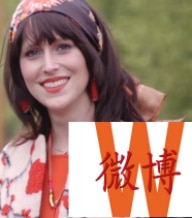
Directly support Manya Koetse. By supporting this author you make future articles possible and help the maintenance and independence of this site. Donate directly through Paypal here. Also check out the What’s on Weibo donations page for donations through creditcard & WeChat and for more information.
Spotted a mistake or want to add something? Please let us know in comments below or email us.
©2018 Whatsonweibo. All rights reserved. Do not reproduce our content without permission – you can contact us at info@whatsonweibo.com.
Manya Koetse is the founder and editor-in-chief of whatsonweibo.com. She is a writer, public speaker, and researcher (Sinologist, MPhil) on social trends, digital developments, and new media in an ever-changing China, with a focus on Chinese society, pop culture, and gender issues. She shares her love for hotpot on hotpotambassador.com. Contact at manya@whatsonweibo.com, or follow on Twitter.

China Brands, Marketing & Consumers
More than Malatang: Tianshui’s Recipe for Success
Zibo had its BBQ moment. Now, it’s Tianshui’s turn to shine with its special take on malatang. Tourism marketing in China will never be the same again.
Published
2 weeks agoon
April 1, 2024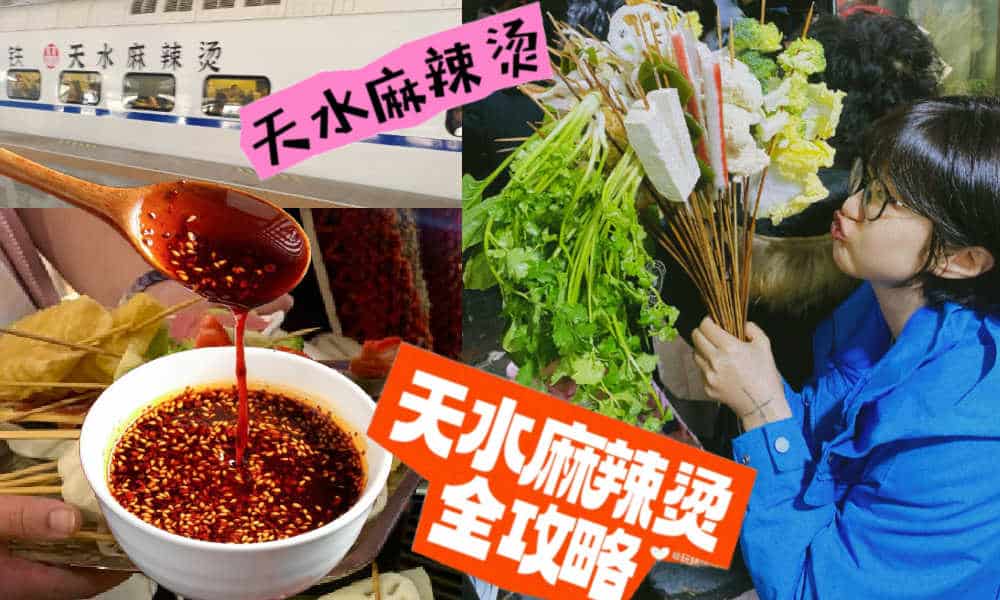
Since the early post-pandemic days, Chinese cities have stepped up their game to attract more tourists. The dynamics of Chinese social media make it possible for smaller, lesser-known destinations to gain overnight fame as a ‘celebrity city.’ Now, it’s Tianshui’s turn to shine.
During this Qingming Festival holiday, there is one Chinese city that will definitely welcome more visitors than usual. Tianshui, the second largest city in Gansu Province, has emerged as the latest travel hotspot among domestic tourists following its recent surge in popularity online.
Situated approximately halfway along the Lanzhou-Xi’an rail line, this ancient city wasn’t previously a top destination for tourists. Most travelers would typically pass through the industrial city to see the Maiji Shan Grottoes, the fourth largest Buddhist cave complex in China, renowned for its famous rock carvings along the Silk Road.
But now, there is another reason to visit Tianshui: malatang.
Gansu-Style Malatang
Málàtàng (麻辣烫), which literally means ‘numb spicy hot,’ is a popular Chinese street food dish featuring a diverse array of ingredients cooked in a soup base infused with Sichuan pepper and dried chili pepper. There are multiple ways to enjoy malatang.
When dining at smaller street stalls, it’s common to find a selection of skewered foods—ranging from meats to quail eggs and vegetables—simmering in a large vat of flavorful spicy broth. This communal dining experience is affordable and convenient for solo diners or smaller groups seeking a hotpot-style meal.
In malatang restaurants, patrons can usually choose from a selection of self-serve skewered ingredients. You have them weighed, pay, and then have it prepared and served in a bowl with a preferred soup base, often with the option to choose the level of spiciness, from super hot to mild.
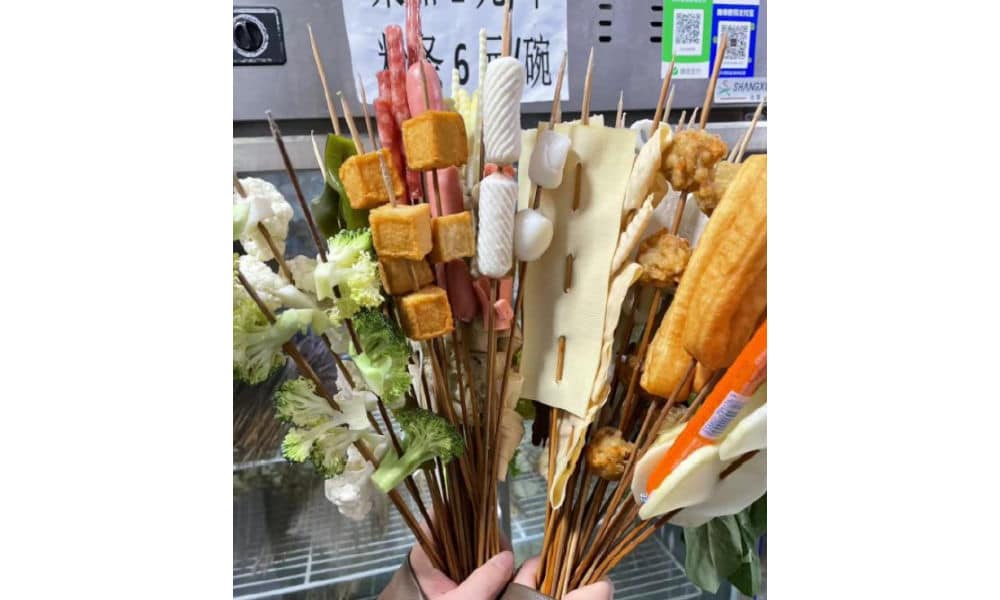
Although malatang originated in Sichuan, it is now common all over China. What makes Tianshui malatang stand out is its “Gansu-style” take, with a special focus on hand-pulled noodles, potato, and spicy oil.
An important ingredient for the soup base is the somewhat sweet and fragrant Gangu chili, produced in Tianshui’s Gangu County, known as “the hometown of peppers.”
Another ingredient is Maiji peppercorns (used in the sauce), and there are more locally produced ingredients, such as the black fungi from Qingshui County.
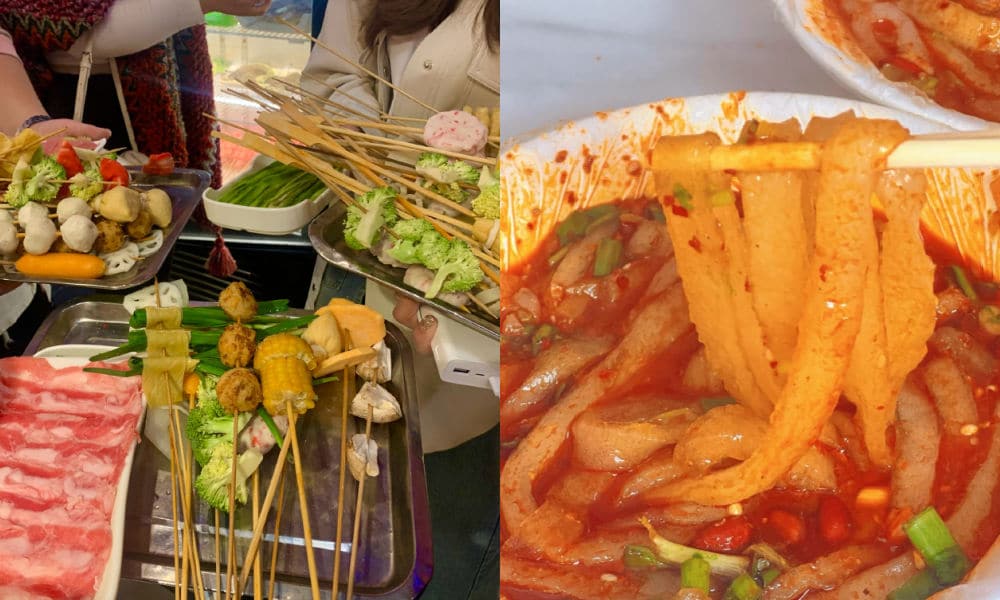
One restaurant that made Tianshui’s malatang particularly famous is Haiying Malatang (海英麻辣烫) in the city’s Qinzhou District. On February 13, the tiny restaurant, which has been around for three decades, welcomed an online influencer (@一杯梁白开) who posted about her visit.
The vlogger was so enthusiastic about her taste of “Gansu-style malatang,” that she urged her followers to try it out. It was the start of something much bigger than she could have imagined.
Replicating Zibo
Tianshui isn’t the first city to capture the spotlight on Chinese social media. Cities such as Zibo and Harbin have previously surged in popularity, becoming overnight sensations on platforms like Weibo, Xiaohongshu, and Douyin.
This phenomenon of Chinese cities transforming into hot travel destinations due to social media frenzy became particularly noteworthy in early 2023.
During the Covid years, various factors sparked a friendly competition among Chinese cities, each competing to attract the most visitors and to promote their city in the best way possible.
The Covid pandemic had diverse impacts on the Chinese domestic tourism industry. On one hand, domestic tourism flourished due to the pandemic, as Chinese travelers opted for destinations closer to home amid travel restrictions. On the other hand, the zero-Covid policy, with its lockdowns and the absence of foreign visitors, posed significant challenges to the tourism sector.
Following the abolition of the zero-Covid policy, tourism and marketing departments across China swung into action to revitalize their local economy. China’s social media platforms became battlegrounds to capture the attention of Chinese netizens. Local government officials dressed up in traditional outfits and created original videos to convince tourists to visit their hometowns.
Zibo was the first city to become an absolute social media sensation in the post-Covid era. The old industrial and mining city was not exactly known as a trendy tourist destination, but saw its hotel bookings going up 800% in 2023 compared to pre-Covid year 2019. Among others factors contributing to its success, the city’s online marketing campaign and how it turned its local BBQ culture into a unique selling point were both critical.

Zibo crowds, image via 163.com.
Since 2023, multiple cities have tried to replicate the success of Zibo. Although not all have achieved similar results, Harbin has done very well by becoming a meme-worthy tourist attraction earlier in 2024, emphasizing its snow spectacle and friendly local culture.
By promoting its distinctive take on malatang, Tianshui has emerged as the next city to captivate online audiences, leading to a surge in visitor numbers.
Like with Zibo and Harbin, one particular important strategy used by these tourist offices is to swiftly respond to content created by travel bloggers or food vloggers about their cities, boosting the online attention and immediately seizing the opportunity to turn online success into offline visits.
A Timeline
What does it take to become a Chinese ‘celebrity city’? Since late February and early March of this year, various Douyin accounts started posting about Tianshui and its malatang.
They initially were the main reason driving tourists to the city to try out malatang, but they were not the only reason – city marketing and state media coverage also played a role in how the success of Tianshui played out.
Here’s a timeline of how its (online) frenzy unfolded:
- July 25, 2023: First video on Douyin about Tianshui’s malatang, after which 45 more videos by various accounts followed in the following six months.
- Feb 5, 2024: Douyin account ‘Chuanshuo Zhong de Bozi’ (传说中的波仔) posts a video about malatang streetfood in Gansu
- Feb 13, 2024: Douyin account ‘Yibei Liangbaikai’ (一杯梁白开) posts a video suggesting the “nationwide popularization of Gansu-style malatang.” This video is an important breakthrough moment in the success of Tianshui as a malatang city.
- Feb – March ~, 2024: The Tianshui Culture & Tourism Bureau is visiting sites, conducting research, and organizing meetings with different departments to establish the “Tianshui city + malatang” brand (文旅+天水麻辣烫”品牌) as the city’s new “business card.”
- March 11, 2024: Tianshui city launches a dedicated ‘spicy and hot’ bus line to cater to visitors who want to quickly reach the city’s renowned malatang spots.
- March 13-14, 2024: China’s Baidu search engine witnesses exponential growth in online searches for Tianshui malatang.
- March 14-15, 2024: The boss of Tianshui’s popular Haiying restaurant goes viral after videos show him overwhelmed and worried he can’t keep up. His facial expression becomes a meme, with netizens dubbing it the “can’t keep up-expression” (“烫不完表情”).
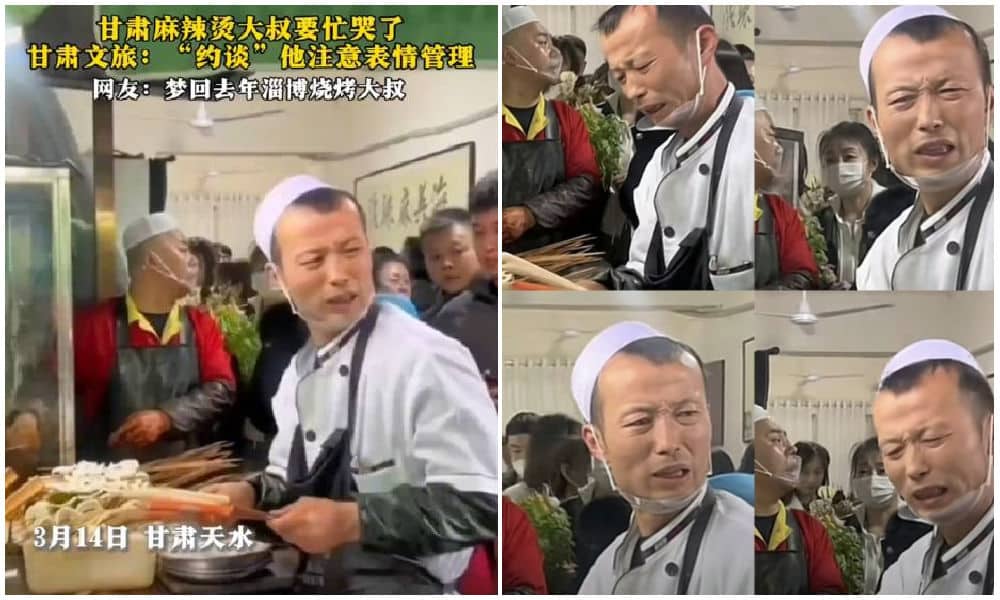
The worried and stressed expression of this malatang diner boss went viral overnight.
- March 17, 2024: Chinese media report about free ‘Tianshui malatang’ wifi being offered to visitors as a special service while they’re standing in line at malatang restaurants.
- March 18, 2024: Tianshui opens its first ‘Malatang Street’ where about 40 stalls sell malatang.
- March 18, 2024: Chinese local media report that one Tianshui hair salon (Tony) has changed its shop into a malatang shop overnight, showing just how big the hype has become.
- March 21, 2024: A dedicated ‘Tianshui malatang’ train started riding from Lanzhou West Station to Tianshui (#天水麻辣烫专列开行#).
- March 21, 2024: Chinese actor Jia Nailiang (贾乃亮) makes a video about having Tianshui malatang, further adding to its online success.
- March 30, 2024: A rare occurrence: as the main attraction near Tianshui, the Maiji Mountain Scenic Area announces that they’ve reached the maximum number of visitors and don’t have the capacity to welcome any more visitors, suspending all ticket sales for the day.
- April 1, 2024: Chinese presenter Zhang Dada was spotted making malatang in a local Tianshui restaurant, drawing in even more crowds.
A New Moment to Shine
Fame attracts criticism, and that also holds true for China’s ‘celebrity cities.’
Some argue that Tianshui’s malatang is overrated, considering the richness of Gansu cuisine, which offers much more than just malatang alone.
When Zibo reached hype status, it also faced scrutiny, with some commenters suggesting that the popularity of Zibo BBQ was a symptom of a society that’s all about consumerism and “empty social spectacle.”
There is a lot to say about the downsides of suddenly becoming a ‘celebrity city’ and the superficiality and fleetingness that comes with these kinds of trends. But for many locals, it is seen as an important moment as they see their businesses and cities thrive.
Even after the hype fades, local businesses can maintain their success by branding themselves as previously viral restaurants. When I visited Zibo a few months after its initial buzz, many once-popular spots marketed themselves as ‘wanghong’ (网红) or viral celebrity restaurants.
For the city itself, being in the spotlight holds its own value in the long run. Even after the hype has peaked and subsided, the gained national recognition ensures that these “trendy” places will continue to attract visitors in the future.
According to data from Ctrip, Tianshui experienced a 40% increase in tourism spending since March (specifically from March 1st to March 16th). State media reports claim that the city saw 2.3 million visitors in the first three weeks of March, with total tourism revenue reaching nearly 1.4 billion yuan ($193.7 million).
There are more ripple effects of Tianshui’s success: Maiji Shan Grottoes are witnessing a surge in visitors, and local e-commerce companies are experiencing a spike in orders from outside the city. Even when they’re not in Tianshui, people still want a piece of Tianshui.
By now, it’s clear that tourism marketing in China will never be the same again. Zibo, Harbin, and Tianshui exemplify a new era of destination hype, requiring a unique selling point, social media success, strong city marketing, and a friendly and fair business culture at the grassroots level.
While Zibo’s success was largely organic, Harbin’s was more orchestrated, and Tianshui learned from both. Now, other potential ‘celebrity’ cities are preparing to go viral, learning from the successes and failures of their predecessors to shine when their time comes.
By Manya Koetse
Independently reporting China trends for over a decade. Like what we do? Support us and get the story behind the hashtag by subscribing:
Spotted a mistake or want to add something? Please let us know in comments below or email us. First-time commenters, please be patient – we will have to manually approve your comment before it appears.
©2024 Whatsonweibo. All rights reserved. Do not reproduce our content without permission – you can contact us at info@whatsonweibo.com.
China Brands, Marketing & Consumers
In Hot Water: The Nongfu Spring Controversy Explained
Nongfu and nationalists: how the praise for one Chinese domestic water bottle brand sparked online animosity toward another.
Published
1 month agoon
March 14, 2024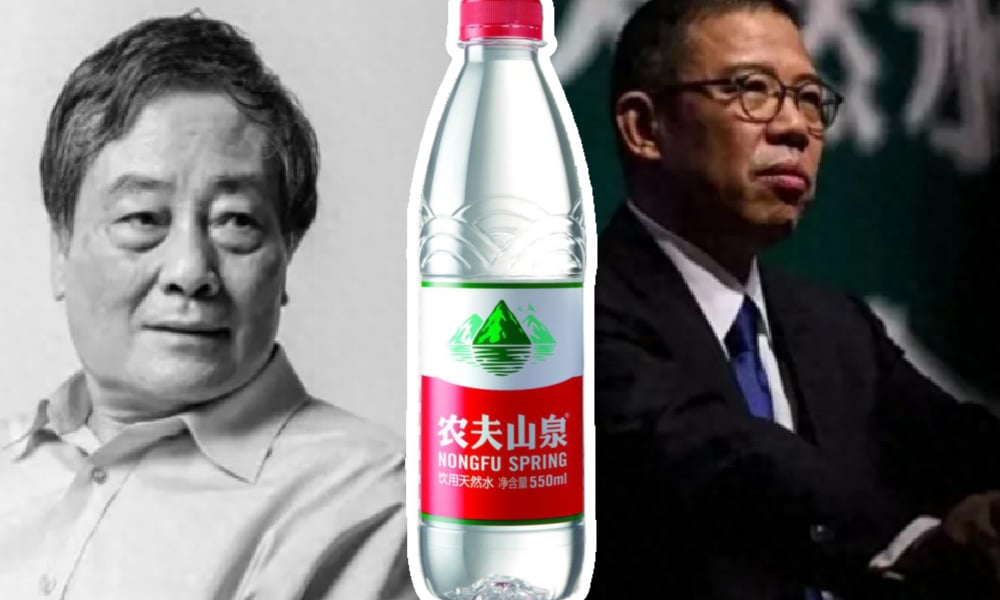
PREMIUM CONTENT
The big battle over bottled water has taken over Chinese social media recently. The support for the Chinese Wahaha brand has morphed into an anti-Nongfu Spring campaign, led by online nationalists.
Recently, China’s number one water brand, Nongfu Spring (农夫山泉) has found itself in the midst of an online nationalist storm.
The controversy started with the passing of Zong Qinghou (宗庆后), the founder and chairman of Wahaha Group (娃哈哈集团), the largest beverage producer in China. News of his passing made headlines on February 25, 2024, with one Weibo hashtag announcing his death receiving over 900 million views (#宗庆后逝世#).
The death of the businessman led to an outpouring of emotions on Weibo, where netizens praised his work ethic, dedication, and unwavering commitment to his principles.
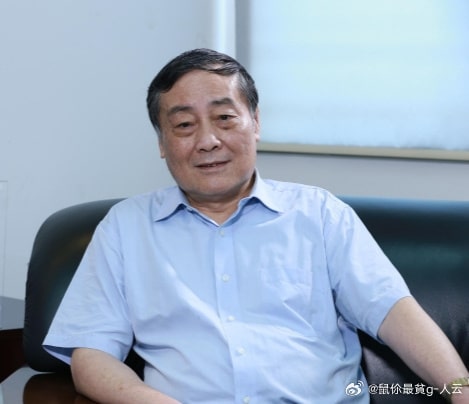
Zong Qinghou, image via Weibo.
Born in 1945, Zong established Wahaha in Hangzhou in 1987, starting from scratch alongside two others. Despite humble beginnings, Zong, who came from a poor background, initially sold ice cream and soft drinks from his tricycle. However, by the second year, the company achieved success by concentrating on selling nutritional drinks to children, a strategy that resonated with Chinese single-child families (Tsui et al., 2017, p. 295).
The company experienced explosive growth and, boasting over 150 products ranging from milk drinks to fruit juices and soda pops, emerged as a dominant force in China’s beverage industry and the largest domestic bottled-water company.

Big bottle of Wahaha (meaning “laughing child”) water.
The admiration for Zong Qinghou and his company relates to multiple factors. Zong was loved for his inspirational rags-to-riches story under China’s economic reform, not unlike the self-made Tao Huabi and her Laoganma brand.
He was also loved for establishing a top Chinese national brand and refusing to be bought out. A decade after Wahaha partnered with the France-based multinational Danone in 1996, the two companies clashed when Zong accused Danone of trying to take over the Wahaha brand, which turned into a high-profile legal battle that was eventually settled in 2009, when Danone eventually sold all its stakes.
It is one of the reasons why Zong was known as a “patriotic private entrepreneur” (爱国民营企业家) who remained devoted to China and his roots.
Netizens also admire the Chinese tycoon’s modesty and humility despite his immense wealth. He would often wear simple cloth shoes and, apparently not caring much about the elite social stratum, allegedly declined invitations to dine with Bill Gates and the Queen of England. He had a people-centric business approach. He prioritized the welfare of Wahaha employees, ensuring the protection of pensions for retired workers, establishing an employee stock ownership plan, and refused to terminate employees older than 45.
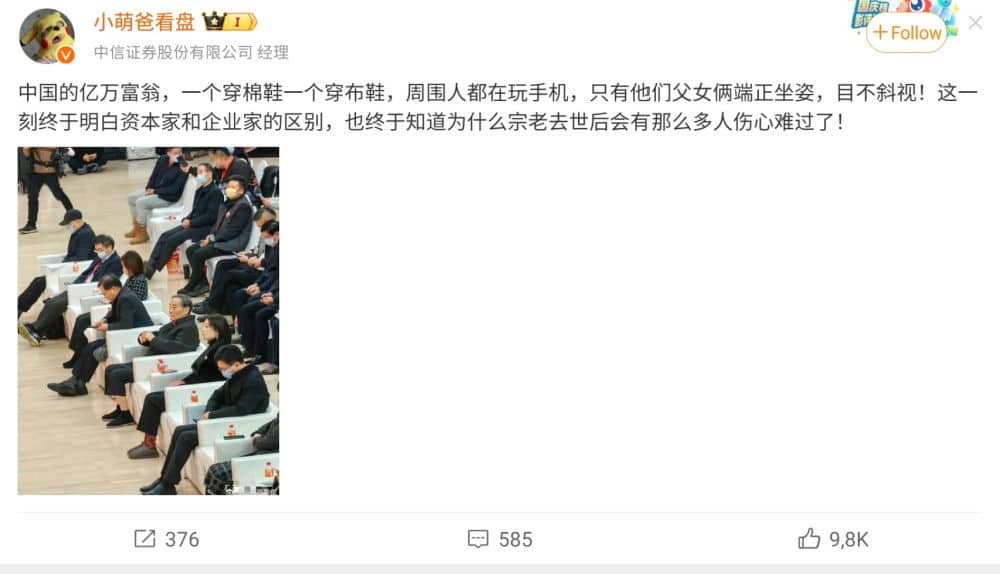
A post praising Zong and his daughter for staying humble despite their wealth: wearing simple shoes and not looking at their phones.
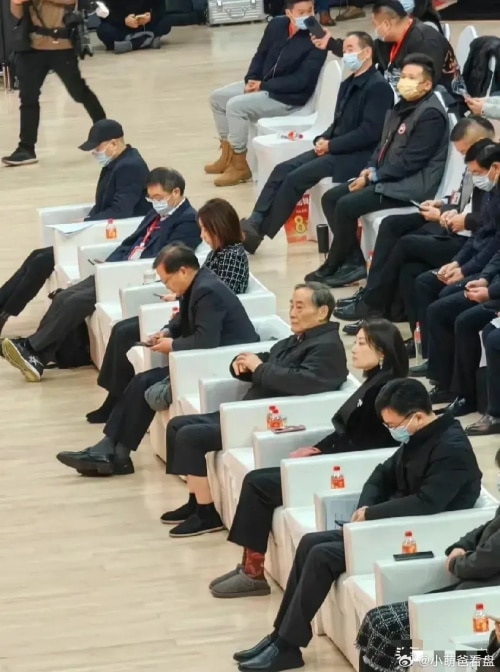
Zong and his daughter stand out due to their simple shoes.
As a tribute to Zong following his passing in late February, people not only started buying Wahaha bottled water, they also initiated criticism against its major competitor, Nongfu Spring (农夫山泉). Posts across various Chinese social media platforms, from Douyin to Weibo, started to advocate for boycotting Nongfu as a means to “protect” Wahaha as a national, proudly made-in-China brand.
From Love for Wahaha to Hate for Nongfu
With the death of Zong Qinghou, it seems that the decades-long rivalry between Nongfu and Wahaha has suddenly taken center stage in the public opinion arena, and it’s clear who people are rooting for.
The founder and chairman of Nongfu Spring is Chinese entrepreneur Zhong Shanshan (钟睒睒), and he is perhaps less likeable than Zong Qinghou, in part because he is not considered as patriotic as him.
Born in 1954, Zhong Shanshan is a former journalist who started working for Wahaha in the early 1990s. He established his own company and started focusing on bottled water in 1996. He would become China’s richest man.
His wealth was not just accumulated because of his Nongfu Spring water, which would become a leader in China’s bottled water market. Zhong also became the largest shareholder of Wantai Biological Pharmacy Enterprise, which experienced significant growth following its IPO. Cecolin, a vaccine against human papillomavirus (HPV), is manufactured by Innovax, a wholly owned subsidiary of Wantai.
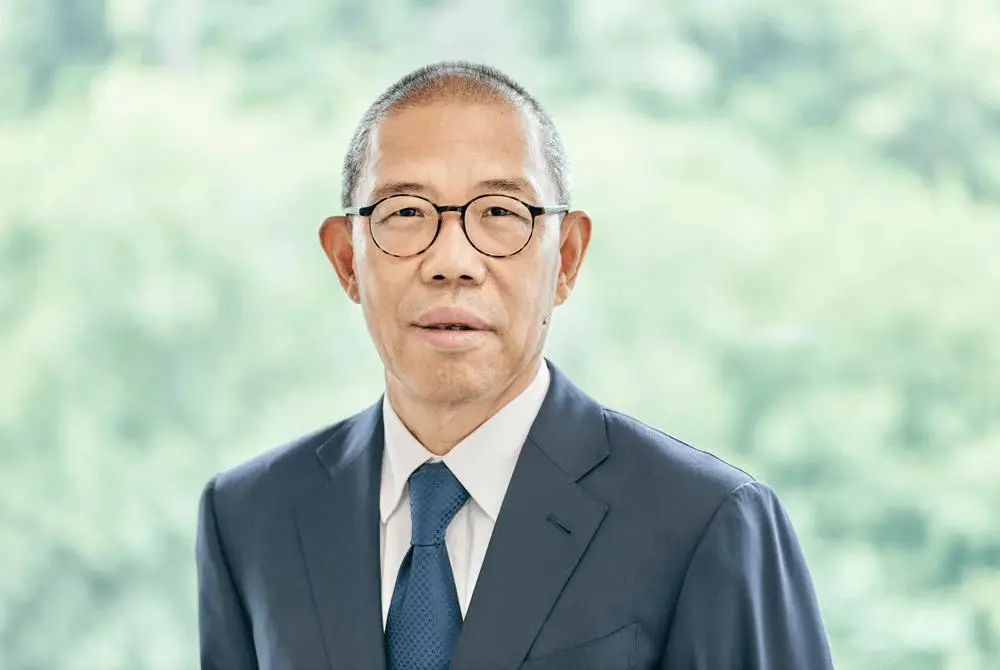
Zhong Shanshan, image via Sohu.
The fact that Zhong Shanshan previously worked for Zong Qinghou and later ventured out on his own does not cast him in a positive light, especially in the context of netizens mourning Zong. Many people perceive Zhong Shanshan as a profit-driven businessman who lacks humility and national spirit compared to his former boss. Some even label him as ‘ungrateful.’
By now, the support for Wahaha water has snowballed into an anti-Nongfu campaign, resulting in intense scrutiny and criticism directed at the brand and its owner. This has led to a significant boycott and a sharp decline in sales.
Netizens are finding multiple reasons to attack Nongfu Spring and its owner. Apart from accusing Zhong Shanshan of being ungrateful, one of the Nongfu brand’s product packaging designs has also sparked controversy. The packaging of its Oriental Leaf Green Tea has been alleged to show Japanese elements, leading to claims of Zhong being “pro-Japan.”

Chinese social media users claim the packaging of this green tea is based on Japanese architecture instead of Chinese buildings.
Another point of ongoing contention is the fact that Zhong’s son (his heir, Zhong Shuzi 钟墅子) holds American citizenship. This has sparked anger among netizens who question Zhong’s allegiance to China. Concerned that the future of Nongfu might be in the US instead of China, they accuse Zhong and his business of betraying the Chinese people and being unpatriotic.
But what also plays a role in this, is how Zhong and the Nongfu Spring PR team have responded to the ongoing criticism. Some bloggers (link, link) argue their approach lacks emotional connection and comes off as too business-like.
On March 3rd, Zhong himself issued a statement addressing the personal attacks he faced following the passing of Zong Qinghou. In his article (我与宗老二三事), he aimed to ‘set the record straight.’ Although he expressed admiration for Zong Qinghou, many found his piece to be impersonal and more focused on safeguarding his own image.
The same criticism goes for the company’s response to the “pro-Japan” issue. On March 7, they refuted ongoing accusations and stated that the architecture depicted on the controversial beverage packaging was inspired by Chinese temples, not Japanese ones, and that a text on the bottle is about Japanese tea culture originating from China.
Calls for Calmer Water
Although Weibo and other social media platforms in China have recently seen a surge in nationalism, not everybody agrees with the way Nongfu Spring is being attacked. Some say that netizens are taking it too far and that a vocal minority is controlling the trending narrative.
Posts or videos from people pouring out Nongfu water in their sink are countered by others from people saying that they are now buying the brand to show solidarity in the midst of the social media storm.
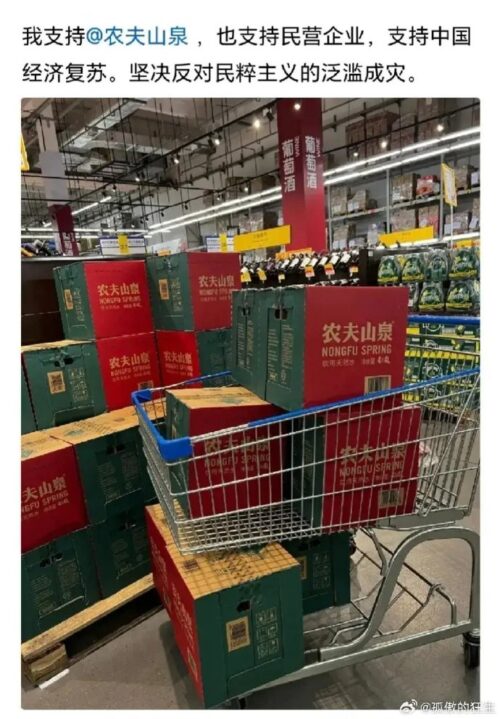
Online photo of netizen buying Nongfu Spring water: “I support Nongfu Spring, I support private entrepreneurs, I support the recovery of China’s economy. I firmly opposo populism running wild.”
While more people are speaking out against the recent waves of nationalism, news came in on March 13 that the 95-year-old mother of Zhong Shanshan had passed away. According to an obituary published in the Qianjiang Evening News newspaper, Guo Jin (郭瑾) passed away on March 11.
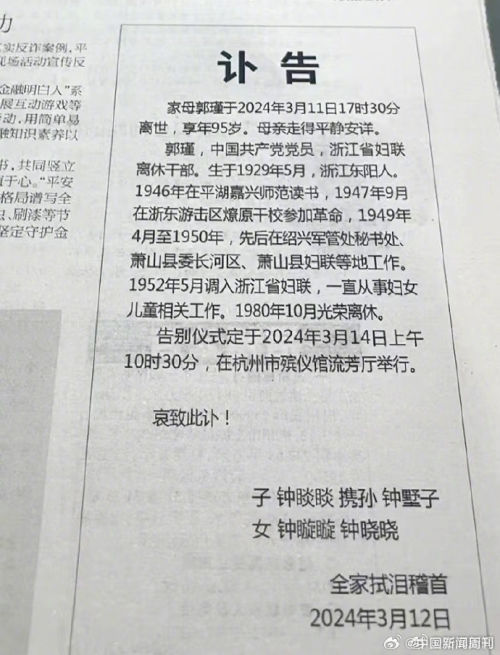
The obituary.
A screenshot of a WeChat post alleged to be written by Zhong Shanshan made its rounds, in which Zhong blamed the online hate he received, and the ensuing stress, for his mother’s death.
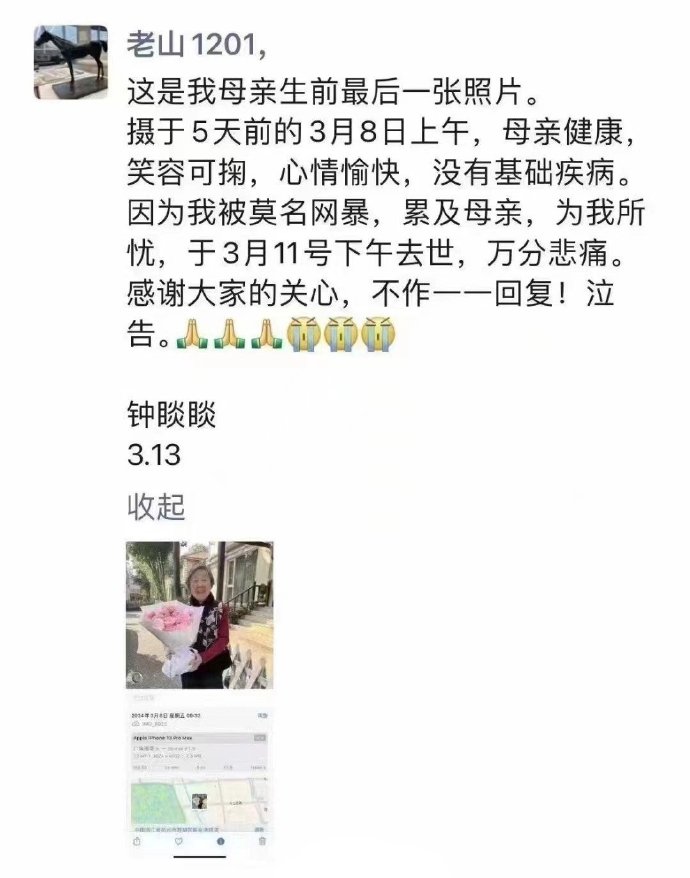
While criticism of Zhong resurfaced for attributing the old lady’s death to “indescribable cyberbullying” (“莫名网暴”), some saw this moment as an opportunity to bring an end to the attacks on Nongfu. As the controversy continued to brew, the Sina Weibo platform seemingly attempted to divert attention by removing some hashtags related to the issue (e.g., “Zhong Shanshan’s Mother Guo Jin Passed Away” #钟睒睒之母郭瑾离世#).
The well-known Chinese commentator Hu Xijin (胡锡进) also spoke out in support of Nongfu Spring and called for rationality, arguing that Chinese private entrepreneurs are facing excessive scrutiny. He suggested that China’s netizens should stop nitpicking over their private matters and instead focus more on their contributions to the country’s economy.
Others are also calling for an end to the waves of attacks towards Nongfu and Zhong Shanshan. Chinese entrepreneur Li Guoqing (李国庆), co-founder of the e-commerce company Dangdang (once hailed as the ‘Amazon of China’), posted a video about the issue on March 12. He said: “These two [Nongfu Spring and Wahaha brands] have come a long way to get to where they are today. The fact that they are competitors is a good thing. If old Zong [Qinghou] were still alive today and saw this division, he would surely step forward and tell people to get back to business and rational competition.”
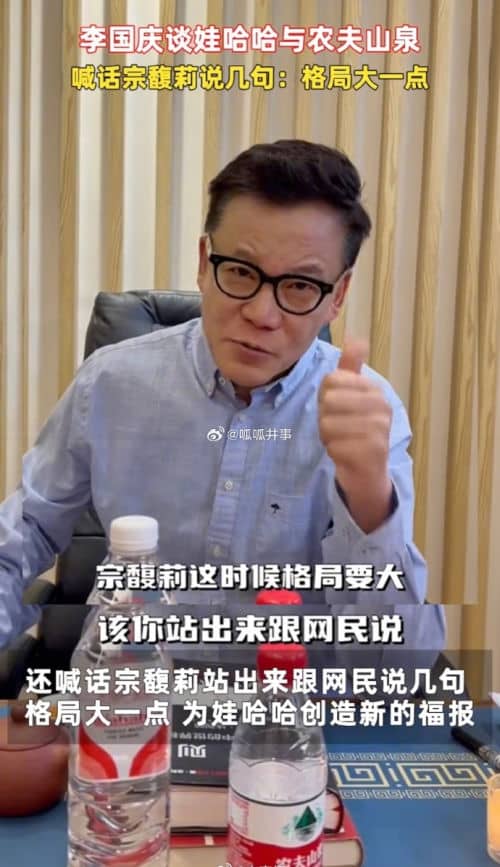
Li Guoqing in his video (since deleted).
Li also suggested that Zong’s heir, his daughter Kelly Zong, should come out, broaden her perspective, and settle the matter. She should thank netizens for their support, he argued, and tell them that it is completely unnecessary to exacerbate the rift with Nongfu Spring in showing their support.
But those mingling in the matter soon discover themselves how easy it is to get your fingers burned on this hot topic. Li Guoqing might have meant well, but he also faced attacks after his video. Not only because people feel he is putting Kelly Zong in an awkward position, but also because his own son. like Zhong Shuzi, allegedly holds American citizenship. Perhaps unwilling to find himself in hot water as well, Li Guoqing has since deleted his video. The Nongfu storm may be one that should blow over by itself.
By Manya Koetse
With contributions by Miranda Barnes
References
Tsui, Anne S., Yingying Zhang, Xiao-Ping Chen. 2017. “Chinese Companies Need Strong and Open-minded Leaders. Interview with Wahaha Group Founder, Chairman and CEO, Qinghou Zong.” In Leadership of Chinese Private Enterprises
Insights and Interviews, Palgrave MacMillan.
Get the story behind the hashtag. Subscribe to What’s on Weibo here to receive our newsletter and get access to our latest articles:
Spotted a mistake or want to add something? Please let us know in comments below or email us. First-time commenters, please be patient – we will have to manually approve your comment before it appears.
©2024 Whatsonweibo. All rights reserved. Do not reproduce our content without permission – you can contact us at info@whatsonweibo.com.
Subscribe

“Old Bull Eating Young Grass”: 86-Year-Old Chinese Painter Fan Zeng Marries 36-Year-Old Xu Meng

Chengdu Disney: The Quirkiest Hotspot in China

Where to Eat and Drink in Beijing: Yellen’s Picks

Weibo Watch: Burning BMWs

More than Malatang: Tianshui’s Recipe for Success

The ‘Two Sessions’ Suggestions: Six Proposals Raising Online Discussions

A Snowball Effect: How Cold Harbin Became the Hottest Place in China

Jia Ling Returns to the Limelight with New “YOLO” Movie and 110-Pound Weight Loss Announcement

Top 9 Chinese Movies to Watch This Spring Festival Holiday

Party Slogan, Weibo Hashtag: “The Next China Will Still Be China”

From Pitch to Politics: About the Messy Messi Affair in Hong Kong (Updated)

Weibo Watch: Frogs in Wells

Looking Back on the 2024 CMG Spring Festival Gala: Highs, Lows, and Noteworthy Moments

Two Years After MU5735 Crash: New Report Finds “Nothing Abnormal” Surrounding Deadly Nose Dive

More than Malatang: Tianshui’s Recipe for Success
Get in touch
Would you like to become a contributor, or do you have any tips or suggestions? Get in touch here!
Popular Reads
-

 China Insight1 month ago
China Insight1 month agoThe ‘Two Sessions’ Suggestions: Six Proposals Raising Online Discussions
-

 China Insight3 months ago
China Insight3 months agoA Snowball Effect: How Cold Harbin Became the Hottest Place in China
-

 China Arts & Entertainment3 months ago
China Arts & Entertainment3 months agoJia Ling Returns to the Limelight with New “YOLO” Movie and 110-Pound Weight Loss Announcement
-

 China Arts & Entertainment2 months ago
China Arts & Entertainment2 months agoTop 9 Chinese Movies to Watch This Spring Festival Holiday

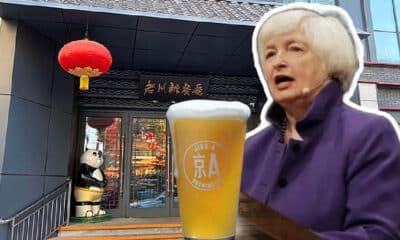


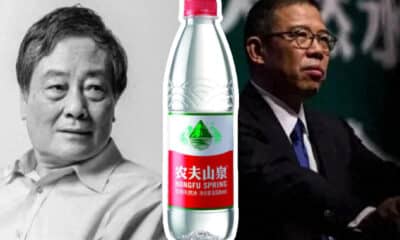


Sotka Pujo
July 3, 2018 at 7:24 pm
So the jew communist are doing same thing they did in west.
Mickey D
July 7, 2018 at 8:28 pm
When I first found out about China’s infiltration of African countries, I believed part of the motivation was for Chinese to have someone to feel superior to, besides the Uighers.
When I first taught in China in 2009, I was very surprised to see how much Michael Jackson and Martin Luther King, Jr. were honored. And later I saw how the black atheletes like Michael Jordan, Kobe Bryant and Lebron James were adored! I can’t remember how many students had Kobe, James and Jordan for their English names. I even had a couple Obamas! But there is apparently a huge difference between black celebrities and black people they don’t know. When I play a song that featured a couple black musicians–really grooving–many students would laugh at how black they were. And some of the darker skinned students were nicknamed Obama. There were some that even laughed at how black Michael Jackson was in the short for “Thriller.” Girls especially, want to be as white as possible, and buy expensive whitening creams. But this article has shown me that the prejudice is deeper than color. It’s racism similar to what we see from lower class whites in the US. Because it’s common for foreign teachers to have better accommodations than Chinese teachers. Reason being, to keep the foreign teacher comfortable, reducing the culture shock, with the goal of the teacher staying a long time.
Uncle Tom
August 19, 2018 at 5:40 am
This article raises the issue of preferences. And that preferring any group over another does in fact amount to discrimination. In the United States it is appearing in public service and in university admissions as well as scholarships and “entitlement” programs. Yet every instance in which the party being discriminated against (in this instance Chinese university students) calls out the blatant discrimination against them, they are portrayed with random examples from unrelated incidents, as racist. These media tactics are abhorrent.